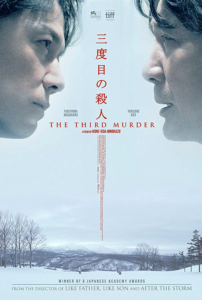Director: Hirokazu Koreeda
Cast: Masaharu Fukuyama, Koji Yakusho, Suzu Hirose, Yuki Saito, Kotaro Yoshida, Shinnosuke Mitsushima, Mikako Ichikawa, Isao Hashizume, Izumi Matsuoka
Running Time: 124 min.
By Martin Sandison
Director Hirokazu Koreeda has gone from strength to strength in the last ten years, with a strong following thanks to films such as Still Walking and Our Little Sister. His most recent, The Third Murder, swept the Japanese Academy Prize last week taking awards for best picture, director, supporting actor, supporting actress and screenplay – so the film comes with a great pedigree. I have to warn you, I’m not a big fan of this director. I have only seen Still Walking and now The Third Murder, however. My favourite aspect of film is visual style, and Koreeda’s style is pretty bland, with The Third Murder being no exception. It’s a shame, because there are some great elements to this movie, especially with regard to acting and approach to character.
Misumi (Koji Yakusho, 13 Assassins) is a factory worker who is in the dock for murdering his boss. His defence team, led by Shigemori (Masaharu Fukuyama, Rurouni Kenshin: Kyoto Inferno) goes to work to prepare their case. Soon the team begin to think something is up, as Misumi wants to change his plea from guilty to innocent in the middle of the case. Shigemori interviews the boss’s daughter Sakie (Suzu Hirose, Rage) and his wife Yamanaka Mitsue (Yuki Saito, Yo-Yo Girl Cop), and tangles of ambiguity occur.
All of the main characters have so many layers, and are depicted so wonderfully, that as the film progressed I was very gripped, despite the issues I had with the style. Koreeda obviously has a way to handle narrative and character that is very fresh. The second half becomes pretty surreal, as the viewer is not force fed what the truth of the case is, and only some little visual pointers create a coherent thread. This could easily become frustrating; but the way it is presented and the strength of the characters and actors create a powerful feeling and mean the viewer must make up their own mind.
Among many strong performances, Yakusho stands out as Misumi. The scenes between him and Fukuyama which occur throughout the film are a masterclass of sensitive acting, with a spiritual power on the part of Yakusho that carries the film through to its conclusion. Fukuyama has the meatiest part, and does well in conveying the increasingly morally and spiritually mixed up lawyer. Another revelation is Hirose as Sakie; she plays it with just the right note of ambiguity, and at such a young age is one to watch out for.
The most often-mentioned influence on Koreeda is the master of traditional Japanese filmmaking, Yaujiro Ozu. The pacing and character design are certainly redolent, as are the realist style with natural lighting. The Third Murder represents a bit of a departure in some aspects, with my other reference point to Koreeda, Still Walking, much more Ozu-Like. In some ways the movie reminded me of Kiyoshi Kurosawa’s recent Creepy, with a similar plot line. That film’s aesthetic is much more up my street, with an expressionistic style that compliments the sinister goings on.
The first half of The Third Murder (apart from the opening scene, which is superbly shot) is a little plodding and uninspired visually, but after the fact it becomes much more interesting. The motif of a cross is used in an unusually brilliant way, one that makes the viewer question the real direction of the narrative, and serves as a reminder that reality is not always what one perceives it as. A flawed but at times brilliant work.
Martin Sandison’s Rating: 7/10




Good review, Martin. I am a Koreeda fan and have tried to see every one of his films available in the States. As you noted, he has a lot in common with Ozu, which is part of why I’m so curious to see this one. A dark murder mystery definitely seems like a major departure for the director. Interesting to read that his style didn’t change much with the change in genre.
Thanks Kyle! Comparing the two from Koreeda I’ve watched there certainly is a big difference in many aspects. I just wish I liked his aesthetic! I’m guessing you’ll like this one.